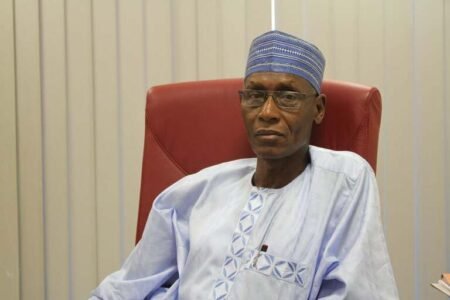Bill Gates, an American billionaire and philanthropist, said on Wednesday that Nigeria’s economy has stagnated, noting that the country’s revenue-to-GDP ratio was higher 15 years ago than it is today.
He recommended the federal government concentrate health-care investment as a strategy of revitalising the economy.
Gates, who attended the National Executive Council meeting at State House in Abuja, emphasised the need for investing in Nigeria’s most precious asset—its people—while addressing the country’s economic challenges.
He acknowledged that Nigeria is facing budgetary restrictions but emphasised that the people’s health comes first.
Gates said, “Nigeria’s economy has stagnated. Earlier this year, your debt exceeded 50 percent of your GDP for the first time since 2001. And while your revenue-to-GDP ratio has grown, it’s still lower than what it was 15 years ago. The result is that Nigeria spends less per capita on its people than other African countries with a fraction of your wealth.
“I understand this is a politically sensitive area. Nigerians are struggling. Incomes have fallen. Prices have soared. And like in many other countries, people are protesting.
“Taxes are never popular. That’s true in America too. But they’re part of a social compact. People are more likely to pay them when they see the government spending that money to give Nigerians a better life.”
He emphasised the need for the government to invest in human capital, beginning with increased healthcare spending.
He said, “After all, priorities without funding are only words. And I know that right now, it’s impossible to give every priority the funding it needs. That’s why it’s more important than ever to focus on the areas you know will make the greatest difference.
“I’ll start with health, because without health, there can be no opportunity.
“Primary care is the first—and sometimes, the only—point of contact most patients have with the health system. Yet Nigeria spends just 3,000 naira on primary health care per person per year. 70% of your spending goes to secondary and tertiary care, compared to just 30% for primary care. That ratio should be reversed.
“Last year, the Federal Government launched an ambitious HPV vaccination campaign. In one month, Nigeria immunised more girls than 40 other Gavi countries combined did the entire previous year. In total, Nigeria reached more than 12 million girls with this life-saving vaccine.
“That’s genuinely incredible. And I hope you carry the lessons from that campaign to future efforts.”
He disclosed that he had been visiting Nigeria for over two decades, noting that over the years, the Bill & Melinda Gates Foundation had invested over $2.8 billion in Nigeria, the largest such investment in Africa.
Gates stated, “I have been coming to Nigeria for over two decades now. In that time, I have seen performances by Afrobeats legends. I have formed friendships with leaders across sectors. And I’ve met with innovators who are changing the world.
“I am also proud to support their work. To date, our foundation has invested over $2.8bn in Nigeria. It’s our largest commitment in all of Africa.”
Gates mentioned that while President Bola Tinubu’s Renewed Hope Agenda was ambitious, it faces resource constraints.
Gates noted, despite common knowledge that nutrition is crucial for public health and that agriculture plays a vital role in ensuring proper nutrition, “Nigeria has the second-highest rate of food insecurity on earth.”
“You’ve seen how the problem has grown worse as climate change has accelerated. Arable land has disappeared. Pests have wiped out harvests. And prices for staple foods have soared.
“But there are some ways to address this crisis, I hope you’ll consider.
“First, Nigeria needs more funding for extension workers to advise and support farmers; fertilisers to make sure the soil is healthy enough to grow more crops; and infrastructure so that farmers have roads to bring their goods to market.
“One key solution is to embrace the new generation of innovative crop varieties that have shorter growing periods, higher yields, and greater resistance to pests,” the philanthropist said.










